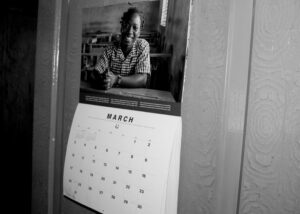Is the paraclete always comforting?
Re: “Spiritual attunement: Part 4 of a series,” Jan. 6, page 16.
I enjoyed Troy Watson’s recent column. The image of being pickled in the Spirit is a great one.
It may, however, be worth considering if the paraclete always “comforts, encourages, uplifts and defends.” Watson speaks from his own experience of coming to terms with critical voices masquerading as God, but there may be other experiences which call forth different responses from the paraclete.
Could it be that the Spirit of God sometimes does make us uncomfortable? Convicts us of sin? Gets under our skin? I can think of numerous biblical examples.
It’s true that God wants the very best for us, but this doesn’t preclude the paraclete from being a pain sometimes!
Scott Brubaker-Zehr, Kitchener, Ont.
Young Voice praised for ‘excellent article’
Re: “Remembering Yoder honestly,” Jan. 6, page 33.
My thanks to Susie Guenther Loewen for her excellent article.
Canadian Mennonite has published several articles referring to John Howard Yoder’s sexual abuse of women. I have long wondered what the abuse consisted of, since “sexual abuse” can cover anything from looks or words to touching and brutal rape.
Loewen’s article mentions “extra-marital affairs,” which I assume means sexual intercourse in a situation of serious emotional power imbalance but without physical force. If this is not correct, then I hope someone will enlighten me and perhaps others who have wondered as I have. (There is no indication in the record that Yoder’s sexual abuse included sexual intercourse. Ed.)
I was also interested in her argument about the likelihood of his actions, and the attitude implied, affecting his writings. Without having studied the issue or read much of Yoder’s writing, I cannot see how her argument could be other than correct, since he is addressing issues that relate closely to his own behaviour.
Edward J. Wiebe, Edmonton
History prof questions disclaimer for John Howard Yoder books
I am disappointed to read that MennoMedia is issuing a disclaimer regarding John Howard Yoder’s books on account of his sins (“Disclaimer to be included in John Howard Yoder books,” Jan. 6, page 28). What is MennoMedia planning to do with the books of all its other authors, and what are the roots of the desire to continue to chasten a man who has died?
There is a caution for all of us in Romans 2:1-3: “You, therefore, have no excuse, you who pass judgment on someone else, for at whatever point you judge another, you are condemning yourself, because you who pass judgment do the same things. . . So when you, a mere human being, pass judgment on them and yet do the same things, do you think you will escape God’s judgment?”
I have similar misgivings with Susie Guenther Loewen’s comments about Yoder’s books in the same issue (“Remembering Yoder honestly,” page 33). She says that Yoder’s “ ‘revolutionary subordination’ . . . never did sit right with me.” She describes it as “abstract, context-less gender equality,” which does not analyze “deep-seated power imbalances” between men and women.
Fair enough. It’s a legitimate assessment. Literature on gender in his generation is full of such descriptions. When we see such time-bound observations, we note this and proceed with our own writing, conscious of the judgment of the generation which follows us.
Loewen and the people she cites rightly shift the responsibility onto Yoderians and negligent conference and seminary officials. Still, she has decided to mention Yoder’s abusiveness when using his books. What will she do with the books of other sinners she uses?
Her claim to honesty is astonishing. In general, it would be good for us all to make claims to innocent knowledge with great care, and to focus on our own living generation. It is important to challenge our tendency as humans to glorify mostly those with whom we agree and whose writings are pleasing to us.
I attended a total of five Mennonite educational institutions. The tendency to glorify professors uncritically was present in all of them.
John Klassen, Langley, B.C.
John Klassen is professor emeritus in Trinity Western University’s Department of History.
Stories about John Howard Yoder must stop . . . for his family’s sake
Re: “Remembering Yoder honestly,” Jan. 6, page 33.
I disagree with Susie Guenther Loewen’s comment: “I don’t think Yoderians have been sufficiently conscientious about acknowledging and naming his abusiveness and its ongoing ramifications.”
As deplorable and truly sad as were John Howard Yoder’s actions, I believe that there has been enough coverage of this matter in Canadian Mennonite and other publications. As a friend of the family, I feel for his wife and children when this matter is repeated over and over again. We still read the psalms of David and refer to the patriarchs of the Old Testament in spite of their sexual misconduct.
Whether or not Yoder can be blamed for the lack of “female academic theologians,” I am not convinced. I recognize that readers and students have felt deep disappointment when the news broke—in fact, I was in Elkhart, Ind., when the story hit the news—and have met some of the “victims.” But who can judge the sincerity of his response to the disciplinary action of the church?
I, too, want to hold “his brilliance and his brokenness together,” but enough has been published.
Helen Dueck, Winnipeg
Unlearn the Bible? A thousand times no
Re: “Unlearning the Bible to welcome homosexuals,” Jan. 6, page 15.
Gerhard Neufeld asks, “What is the Bible?”
It is God’s love letter to a hopelessly lost and fallen human race, showing us the way of salvation, eternal life, joy and hope:
- The Word of God is living and active (Hebrews 4:12).
- Salvation is found in no one else (Acts 4:12).
- God’s Word in our heart keeps us from sinning (Psalm 119:11).
Jesus quoted Scripture to defeat the temptations of Satan. He suffered and died on the cross for our sins and arose again as victor over sin, death and Satan. His Sermon on the Mount is his kingdom consultation for happiness, life and morality. Each person must choose either the broad way or narrow way, serve God or mammon, and build on a foundation of rock or sand.
So my advice is, dig deep in the Word, have faith in Jesus, pray, repent, trust the guidance of the Holy Spirit to renew your mind and purge all evil thoughts and violence, knowing that the best is yet to come.
But “unlearn the Bible” and more than two thousand years of Christian education? A thousand times no.
Neil Klassen, Rosemary, Alta.
Setting the record straight about thrift shop contributions to MCC
Re: “MCC is more than thrift stores to MCI students,” Jan. 6, page 31.
An error was reported in this article regarding Mennonite Central Committee (MCC) thrift shop contributions to the MCC Manitoba budget. The most recent audited financial statements of MCC Manitoba (March 31, 2013) report thrift shop contributions of $2.639 million, but the article reported “more than $6 million of MCC Manitoba’s budget is covered by the province’s thrift store sales.”
While the total sales of MCC thrift shops in Manitoba may be in the range of $6 million, the average contribution to MCC Manitoba’s budget is in the range of 50 percent of gross sales. Operating costs, mortgage payments, capital reserve allocations and additional contributions to local community charities typically represent the remaining 50 percent.
Ron Janzen, Winnipeg Ron Janzen is executive director of MCC Manitoba.
Reader grateful for those who provide ‘a safe place’
Re: “Silence and spinning wheels,” Jan. 20, page 26.
The story of Martha and Paul Snyder providing a safe place for those who, because they are not heterosexual, are shunned by their family, caused me to think of my mother and my mother-in-law.
Both suffered being slashed with a pointer across their fingers because they were part of the 10 percent of the population who were not right-handed. They wrote with the right hand at school. At home, they were left-handed. I am thankful that these two women were safe at home.
I am grateful that they did not live in the years 1450-1750, when left-handed people were considered to be witches. Even as late as the 1960s and ’70s, Catholic school teachers inflicted corporal punishment on those who were not right-handed.
It seems that sometimes we do not like minorities. We find it difficult to understand those who are not like us. We all know of the past persecution and killing of those not heterosexual. We have all heard of what occurred under Hitler’s regime. In some parts of the world it is still illegal to be in the minority group that is not heterosexual, and the punishment is death.
Those shunned are out in the cold, wrapped in a sheet of condemnation. Some have found a safe house and are wrapped in a warm blanket of love. For those who provide a safe house, I am grateful. Perhaps someday the church, too, will become a safe haven.
Bertha Landers, R.R. 1, Waterloo, Ont.
‘Dominion’ is biblical imperative for creation, not ‘stewardship’
Re: “Students say YESS! to creation care,” Jan. 6, page 30.
How heartening to see the students at Rosthern (Sask.) Junior College taking initiative on matters of earth justice and doing so in conversation with their first nation neighbours. May the wider church have the courage to follow their example.
Yet one thing puzzles me. The article states: “The Faith and Life Committee chose the word ‘stewardship’ intentionally as part of the event’s title. Although not part of most teenagers’ vocabulary, the word is used in biblical texts pertaining to caring for the earth and is a word that carries with it the idea of moral responsibility.”
Unfortunately, this is simply untrue. Indeed, stewardship has become an eco-theology buzzword, but it is not a biblical concept. Rather, it has arisen from a desire to tone down the biblical imperatives to “subdue the earth and have dominion over it” (Genesis 1:28).
This desire is understandable, even commendable. But I think it’s a wrong and misleading strategy to simply claim that “stewardship” is what the Bible really says. A better strategy, I propose, would be to face honestly the fact that the Bible has nothing much to say about ecology as we now understand it, nor about the ecological crisis that is now upon us.
Once we have made such an admission, we may, I hope, be able to see new and deeper—if less direct—ways in which the Bible can be a resource for a justice-seeking, eco-aware 21st-century church.
Glenn Sawatzky, Vancouver
–Posted Feb. 12, 2014





Leave a Reply
You must be logged in to post a comment.